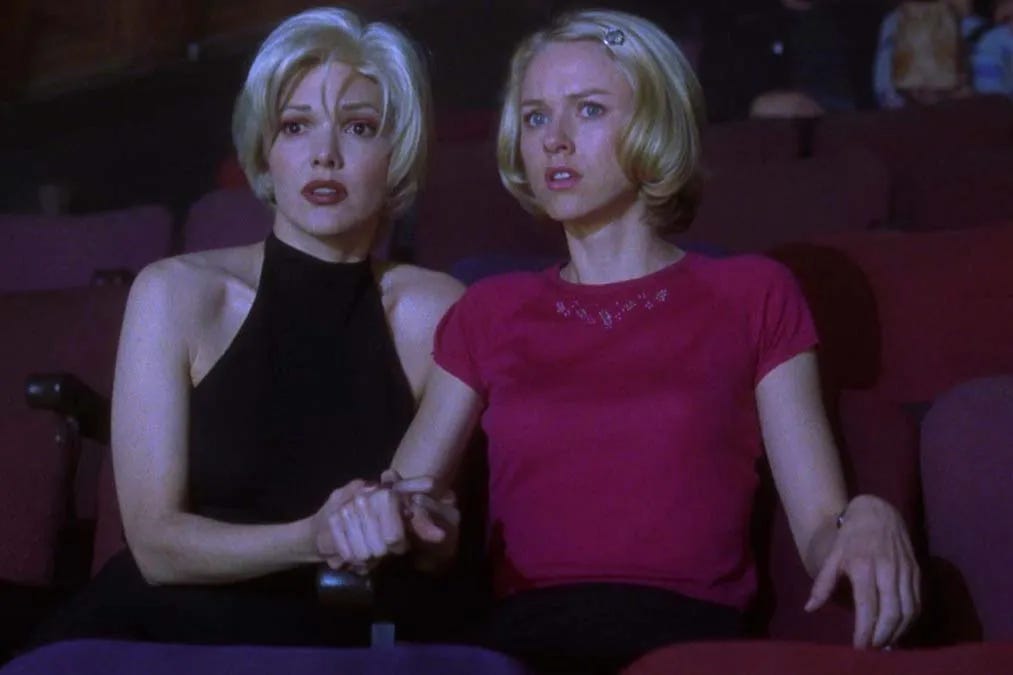It was 2002, I was 13, I was at my cousin’s house and we were having a sleepover. (Were we ever supervised by adults? We were not.) She dug around in a drawer and pulled out a DVD her dad had just bought: something with a moody cover, swathes of black and blue, and a ghostly white face looming over the title, Mulholland Dr.
My introduction to David Lynch was basically: can you believe this wacko? Everything I read about him in the early 2000s was a How-To. How to understand what this guy is talking about. How to interpret this scene, that scene. The DVD of Mulholland Dr. even came with an insert titled David Lynch’s 10 Clues to Unlocking This Thriller. I remember sitting on the couch with my cousin trying to answer the questions on the insert (“Who gives a key, and why?”; “What is felt, realized and gathered at the Club Silencio?”), but trying to reach back into my memory of the film for the answers was like trying to parse out the logic of a dream after waking.
Comparing a David Lynch film to a dream is one of the biggest cliches in which a critic can indulge, as is describing any of his films as ‘impenetrable’. Both are true and also not true. None of his films, even Mulholland Dr., which is probably my favorite work of his, is so dense as to require an insert filled with clues. His films just require that you surrender yourself to his vision and allow yourself to react openly and honestly. You don’t need a Ph.D. in film studies to understand what anxieties he’s working through in each project - his images and dialogue clearly reflect his preoccupations with marriage and fatherhood (Eraserhead), the empty promises of the American suburbs (Blue Velvet), and the morally bankrupt Hollywood machine (Mulholland Dr.). They are fun to analyze and argue about, but they are by no means opaque.

I remember where I was the first time I saw every David Lynch movie I’ve seen. I watched The Straight Story in a high school film class shortly after I had seen Mulholland Dr. and I was like, I’m sorry, did the same guy make this? (Great movie, though.) I watched Eraserhead in my basement at home when I was 15 and I was too scared to finish it. (To this day, Eraserhead is the most scared I have ever been watching a movie. Too much dread!) I watched Blue Velvet, also in high school, and I will never forget how hollow it made me feel afterwards, walking through my neighborhood, looking for ears. I watched Dune with my college boyfriend, both of us sandwiched uncomfortably in a twin XL bed; we didn’t really connect with it, but I liked Kyle MacLachlan. And so on. The mysteries persisted.
Lately, I’ve been rewatching Twin Peaks (I started it again last week, because life is a cosmic joke). One of the guiding principles I try to follow as a writer is “Every scene should be singular”, because I strongly believe that, as a writer, there is, or should be, no such thing as a throwaway scene. Any information you need to convey to a reader or a viewer should be done in a way that is as interesting and unique as any big set piece or dramatic confrontation! And Twin Peaks is a show that fulfills this criterion beautifully. A scene where one character is checking a safety deposit box features a stag head that was once mounted on the wall but has since fallen. Another scene begins with a minor character dancing their way into the room. Many scenes feature donuts spread out and stacked unusually on conference tables, a visual extreme of a “cops love donuts” gag. Ben and Jerry eat Brie-and-butter sandwiches from Paris with libidinal zeal. These flourishes create a world that is bizarre but also, in its oddness, more realistic than anything you might see on, say, NCIS.
This is to say nothing of the person David Lynch, who always made me smile when he popped up somewhere unexpected. His cameo in The Fabelmans was the highlight of the movie. He used a cow to try to get Laura Dern an Oscar nomination. He read weather updates daily and spoke passionately about Transcendental Meditation. It is folly to engage in idol worship, for artists are just people, but he truly seemed like he was a decent guy who lived to make art, and I always admired that about him.
American cinema has lost one of its greatest auteurs, and the world feels a little less weird without him in it. I trace back so many of my cinematic influences to the two Davids, Lynch and Cronenberg; I don’t know what my life would look like if I had never cracked open that DVD of Mulholland Dr. twenty-three years ago. How lovely it is to engage with art that is dark and terrifying but also deeply imbued with the boundless power of love and joy. How lucky we are to be able to watch Twin Peaks whenever we want, how wonderful it is to peek back the curtain of Lost Highway and rewire our brain chemistry for a bit. How wonderful it is that one man was able to dream up all these gifts to the world.
The rest, as they say, is silencio.



